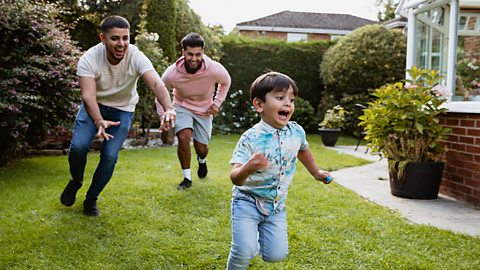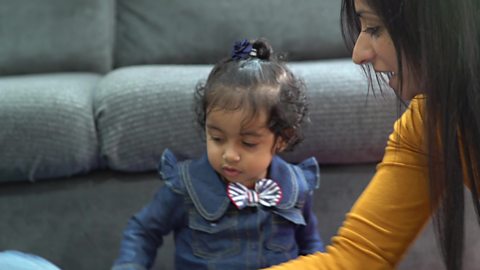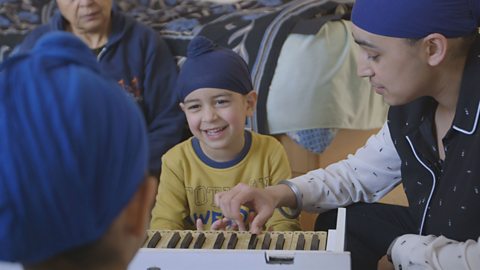If you speak more than one language at home, you might already be wondering how and when to introduce them to your baby. And you might have heard a few things about language learning that simply arenât true â there are plenty of myths around.
A common myth is that speaking more than one language confuses children and can lead to speech delay. In fact, being able to speak more than one language has huge benefits, says specialist speech and language therapist Catherine Pape.
âThe majority of the world population speaks more than one language. Babies are born ready to learn languages, and can absorb any language spoken around them,â explains Catherine. âRaising your child in two or more languages will help the development of their brain, their self-confidence, wellbeing and learning skills; and also means theyâll be better equipped to learn other languages later on in life."
There are also cultural benefits: theyâll feel closer to people and part of their community.

Supporting your child â advice from experts and other parents
Start speaking to your child in your other languages as early as possible, recommends Catherine. âTalk to your baby before they are born, using whichever language you feel most comfortable with.â
Maria is raising her daughter in English, Swahili and Gujarati. âItâs important to start from them being tiny with basic communication,â she says. âWe use words from all the languages, although Swahili is the hardest to include.â
Donât worry if your children mix up languages â itâs normal and doesnât mean that they donât understand them, says Catherine.
Their brains are wired to pick up more than one language and hearing multiple languages is not confusing.
Delphineâs three children are bilingual in French and English and mix the two languages, resulting in a lot of âFranglishâ in the home (both Delphine and her husband are French). âThey are more exposed to English, so it seems to take over in their brain and they use more English sentence structure when speaking in French.â
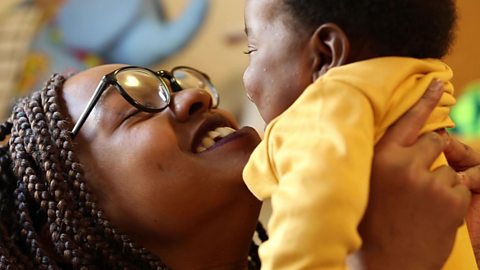
Respond to what your child shows an interest in, and take these opportunities to introduce new words, adds Catherine. âWhen they do start to talk, some children might respond in only one language and parents sometimes find this difficult. There's no need to worry, just model the word back in the language you are using. The child will learn to understand the language whether they actually speak it themselves or not.â
Donât feel that you need to tell the child to use a specific language, says Catherine.
Apply the same rule to them as you do to yourself: use whichever language you feel most comfortable with in that moment.
But itâs worth being consistent in speaking all your languages even if your child is keen to speak one more than others, recommends mum Mandeep. âWe make a conscious effort to speak Punjabi even though my son prefers to speak in Englishâ. Equally, Zeynep who is teaching her son Turkish, says patience is important too. âI try not to force him too much to use a particular language as this might create a more negative attitude in the long run.â
When theyâre older, explain what being bilingual or multilingual actually means, so they know why they speak different languages to their friends. Make clear how it can help them feel connected to their family background.
Mandeep says that her son is more open to different cultures and involved in his community because he speaks Punjabi. âItâs good for him to speak to older Sikhs at the gurdwara so that theyâre not isolated.â
Common questions about bilingualism
| Question | ŽĄČÔČő·É±đ°ù⊠|
|---|---|
| Are my kids are âtoo oldâ to learn a language if they havenât spoken it since birth? | âThe earlier the child experiences another language, and the more they are exposed to it, the easier it will be for them to learn. This doesnât mean, though, that itâs too late for older children, and even adults! Itâs never too late to become fluent in a language,â says Catherine. |
| Do I need to switch to English when my child starts school? | This is something that lots of parents worry about. However, there is no need to use the language your child will be educated in (it might be English or another language such as Welsh) at home. They will get enough exposure at school to this language and learn it at a rapid pace. Your home and community might be the only places your child will hear their home language(s), so it's best to use it as much as possible. |
| Should I give up if my child doesnât respond to a language? | âIf there are more than two languages in your home, donât worry, your baby will be able to work it all out in time,â says Catherine. âEveryone should use the language they feel most comfortable with.â |
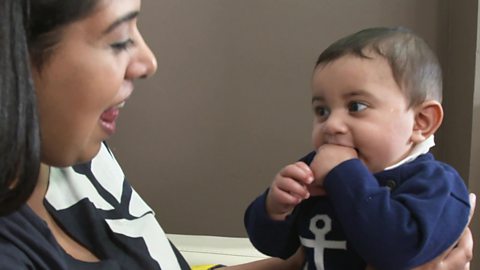
Top tips for raising your child as bilingual or multilingual:
Spend time speaking with your child in each language and set aside specific time to speak languages theyâre less used to. Don't worry about switching between languages as this is normal, helpful and most bilingual or multilingual people do it without even realising.
Play bilingual games with your child, which are fun and will encourage them to take control and use both languages.
Sing and tell stories in different languages â the rhyme and repetition help children remember words and how theyâre made. Some families find it useful to add signs or gesture as they are the same in different languages.
If possible, watch TV or set DVDs and streaming services in your second languages occasionally.
Read to your children in different languages. Use wordless books if you can't read in your home language or it's a language that doesn't have a written form.
Set mobile devices to your other languages.
Find social opportunities for your children to use their languages; they could join a group or visit friends or relatives who speak them too.
Check out .

